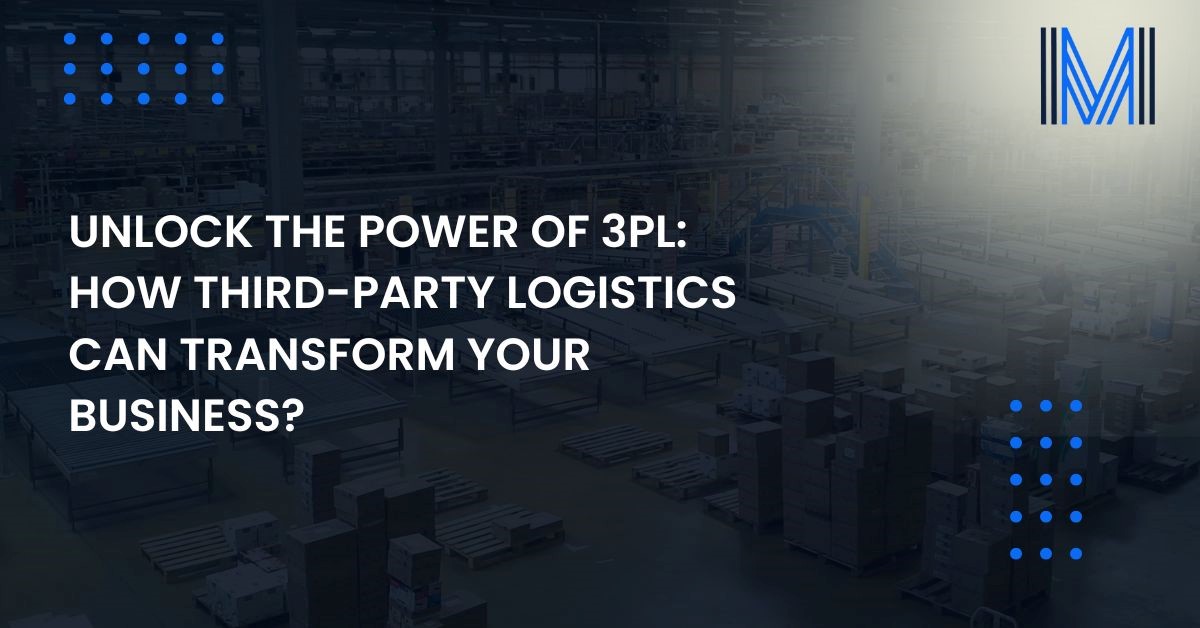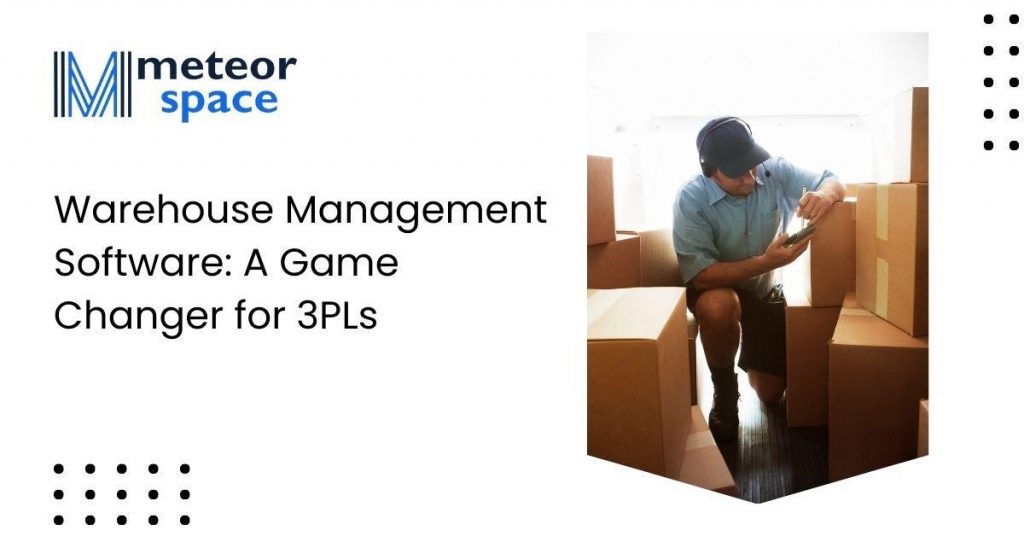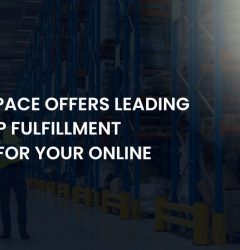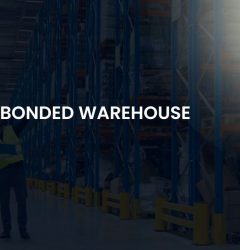15 Aug

In today’s competitive market, businesses are always on the lookout for ways to streamline operations and reduce costs. One of the most effective solutions to these challenges is partnering with a Third-Party Logistics (3PL) provider. By outsourcing logistics functions such as transportation, warehousing, and inventory management, companies can focus on their core operations and significantly improve their efficiency.
In this blog, we’ll explore the benefits of 3PL services, supported by the latest industry statistics, and why your business should consider outsourcing logistics to a reliable 3PL provider.
Why Your Business Needs a 3PL?
As businesses scale, managing logistics in-house can become a complex and costly endeavor. Whether it’s coordinating shipments, managing inventory, or ensuring timely delivery, logistics can take up valuable time and resources. This is where a 3PL comes into play. By leveraging the expertise and infrastructure of a 3PL, businesses can:
- Cut costs by eliminating the need for costly warehousing and transportation infrastructure.
- Improve delivery times, ensuring customer satisfaction.
- Scale operations seamlessly without worrying about logistical bottlenecks.
Let’s take a closer look at the statistics and key trends that prove how outsourcing logistics can propel your business forward.
The Evolution of the Global 3PL Industry
The 3PL industry has seen tremendous growth over the years, driven by the rise of eCommerce, globalization, and technological advancements. The ability of 3PL providers to offer comprehensive logistics solutions, including warehousing, distribution, and transportation, has made them invaluable partners for businesses of all sizes.
Key Statistics Driving the Growth of 3PL
- 2019: Rail and road transport accounted for approximately 25% of the global transport market (IbisWorld, 2021). Rail and road transportation remains a popular choice for businesses due to its cost-efficiency and environmental benefits. Many companies are now focusing on reducing their carbon footprint, and rail and road transport provide an eco-friendly option with the ability to transport large quantities of goods at a lower cost.
- 2020: The global 3PL market generated $921.49 billion in revenue (GlobeNewswire, 2021). As businesses increasingly relied on 3PL providers to handle logistics, warehousing, and shipping, the market witnessed substantial growth. Outsourcing allowed companies to focus on other business functions, improving overall efficiency.
- 2021: 3PL providers generated $961.8 billion in revenue (FortuneBusinessInsights, 2022). This continued growth highlights the trust businesses place in 3PLs to handle logistics and supply chain management. The use of technology to optimize fulfillment processes has been a key driver in this revenue growth.
- 2022: The global 3PL market surpassed $1 trillion in revenue (Statista, 2023). This is a major milestone, showcasing how essential 3PL services have become for businesses seeking to reduce costs, improve customer service, and scale efficiently.
- 2023: The market is projected to continue growing at a compound annual growth rate (CAGR) of 8.3%, reaching $1.5 trillion by 2025 (Statista, 2023). With more businesses, particularly in the eCommerce sector, outsourcing logistics, the demand for 3PL services is only expected to rise.
How 3PL Services Cut Costs and Improve Efficiency?
The potential for cost savings and improved efficiency primarily drives the decision to outsource logistics to a 3PL provider. Here’s how 3PLs help businesses achieve both:
1. Cost Savings
3PL providers operate at economies of scale, which means they can offer warehousing, transportation, and distribution services at lower costs than most companies can achieve in-house. By partnering with a 3PL, businesses can reduce the need for capital investment in warehouses, fleets, and logistics technology. This is especially beneficial for small and medium-sized businesses that may not have the resources to build these capabilities internally.
2. Technology Integration
One of the significant advantages of working with 3PL providers is the access to advanced logistics technology. From warehouse management systems (WMS) to transportation management systems (TMS), 3PLs use technology to optimize supply chain processes. This results in improved inventory accuracy, better visibility into shipping processes, and the ability to provide real-time updates to customers.
3. Scalability
As your business grows, so do your logistics needs. Managing seasonal demand spikes, international shipping, or larger volumes of orders can be overwhelming. With a 3PL, businesses can scale their logistics operations effortlessly. 3PL providers have the infrastructure and expertise to handle fluctuating demand, allowing businesses to scale up or down without investing in additional resources.
Why Businesses Are Relying on 3PL Services?
Key Benefits of Outsourcing to 3PL Providers
Outsourcing logistics offers numerous benefits that directly impact a company’s bottom line and operational efficiency. Some of the key advantages include:
- Focus on Core Business: By outsourcing logistics functions, businesses can dedicate more time and resources to their core competencies, such as product development, marketing, and customer service. This leads to improved business performance and growth.
- Improved Customer Service: 3PLs enable businesses to provide faster and more reliable delivery options to their customers. This enhanced level of service not only leads to increased customer satisfaction but also helps businesses build stronger relationships with their clients.
- Access to Expertise: Logistics and supply chain management are complex fields that require specialized knowledge and experience. By partnering with a 3PL provider, businesses gain access to industry experts who can help optimize their supply chains, reduce costs, and improve efficiency.
Services Businesses Outsource to 3PLs
Businesses across various industries rely on 3PLs to handle different aspects of their logistics operations. Some of the most commonly outsourced services include:
- Domestic Transportation: According to recent data, 86% of businesses outsource their domestic transportation to 3PLs (Masood, 2023). Transportation is a critical component of logistics, and by outsourcing this function, businesses can ensure timely and cost-effective delivery to their customers.
- Freight Forwarding: 44% of businesses outsource freight forwarding to 3PL providers (Masood, 2023). Freight forwarding involves the coordination of shipments across international borders, a process that can be complex and time-consuming. By outsourcing this function, businesses can save time, reduce costs, and ensure that their goods reach their destination efficiently.
- Warehousing: 66% of businesses rely on 3PLs for warehousing services (Masood, 2023). Warehousing is a significant cost for many businesses, particularly those with fluctuating inventory levels. By outsourcing warehousing to a 3PL provider, businesses can reduce overhead costs and improve inventory management.
Moreover, 3PL providers offer specialized services such as UK Fulfillment and Ecommerce Fulfillment UK, which cater specifically to businesses looking to streamline their logistics in the UK. Companies across industries, from eCommerce to cosmetics, rely on these tailored services to meet their storage and delivery needs.
How 3PL Improves Customer Service?
Providing excellent customer service is essential for business success, and outsourcing logistics to a 3PL provider can help improve this area in several ways:
- Faster Delivery: 3PL providers have the infrastructure and networks in place to ensure that orders are fulfilled and delivered quickly. This reduces shipping times and enhances the customer experience, increasing the likelihood of repeat business.
- Real-Time Tracking: Advanced tracking technology used by 3PLs allows businesses to provide real-time updates to customers about the status of their orders. This level of transparency builds trust with customers and reduces the number of inquiries related to shipping.
- Efficient Returns Management: Returns are an inevitable part of doing business, especially in eCommerce. 3PL providers can handle the entire returns process, from receiving and inspecting returned goods to restocking inventory. This ensures a smooth and efficient process, enhancing the overall customer experience.
According to recent studies, 86% of businesses reported improved customer service after outsourcing logistics to a 3PL provider (Masood, 2023). This shows just how impactful 3PLs can be in delivering a positive customer experience.
Who Benefits the Most from 3PL Services?
3PLs are versatile and cater to businesses of all sizes and industries. Some of the sectors that benefit the most from outsourcing logistics include:
1. eCommerce
The eCommerce industry is one of the biggest users of 3PL services. As online sales continue to grow, businesses need reliable partners to handle order fulfillment, shipping, and returns. By outsourcing these functions to a 3PL, eCommerce companies can focus on scaling their operations and improving the customer experience.
2. Retail
Retailers face constant pressure to keep shelves stocked and meet customer demand. Outsourcing warehousing and transportation to 3PLs allows retailers to optimize their inventory levels and ensure products are available when customers need them.
3. Manufacturing
Manufacturers often rely on 3PLs to manage their supply chains, particularly when it comes to warehousing raw materials and distributing finished products. This allows manufacturers to reduce costs and improve production efficiency.
How Businesses Have Benefited from Using 3PLs Over the Years?

The relationship between businesses and 3PL providers has evolved significantly, resulting in positive outcomes for both parties. Statistics show that 97% of 3PL service providers and 91% of 3PL users have experienced success through their partnership (PLS, 2023). This success is primarily driven by transparent communication, effective processes, and the overall work ethic shared between the 3PL and the businesses they serve. As businesses increasingly outsource logistics, both sides benefit from enhanced efficiency, improved operations, and increased profitability.
When there is mutual trust and efficient service delivery, the partnership between a 3PL and its client is bound to thrive. The increase in revenue across the 3PL industry is a testament to how valuable these partnerships have become. The success of businesses that outsource logistics has also translated into satisfaction for 3PL providers, ensuring long-term relationships between both parties.
Cost Reduction with 3PL Partnerships
A notable 75% of shippers have reported significant reductions in overall costs after partnering with a 3PL (PLS, 2023). Cost reduction is one of the primary reasons businesses choose to outsource logistics. By using 3PL services, companies can minimize various expenses, including warehousing, order fulfillment, and transportation costs.-N
3PL providers offer a range of services, from warehousing and storage to shipping, which allows businesses to save on infrastructure and personnel costs. Hiring additional staff to handle logistics internally can be expensive, but 3PLs eliminate this need. The funds saved can then be reinvested into other areas of the business, promoting growth and innovation.
Increasing Dependence on 3PL Services
As businesses continue to see the advantages of using 3PL services, more companies are expected to increase their reliance on outsourced logistics. 58% of shippers plan to expand their use of 3PLs in the coming years (PLS, 2023). This growing trend can be attributed to the wide array of benefits that 3PL providers offer, including faster delivery, enhanced customer satisfaction, and reduced operational stress.
By outsourcing logistics, businesses can focus on their core competencies and allow experts to handle the complexities of supply chain management. 3PL services free up resources, reduce administrative burden, and improve overall efficiency, making them an indispensable partner for many businesses.
The Role of 3PLs in Customer Experience
A positive customer experience is vital for business growth, and 3PL providers play a crucial role in ensuring that customers receive their orders accurately and on time. According to a survey, 89% of younger consumers are more likely to promote a brand after experiencing excellent customer service (3PL Worldwide, 2023). By outsourcing logistics to a 3PL, businesses can offer competitive delivery rates, personalized packaging, and fast shipping, all of which contribute to a positive customer experience.
When customers have a seamless interaction with a business, they are more likely to recommend it to others, helping boost brand loyalty and generate organic marketing. This ripple effect benefits businesses, as satisfied customers often become repeat buyers and bring new customers through word of mouth.
The Importance of Delivery in Customer Retention
However, customer experience goes beyond just initial impressions. 84% of consumers state that they would not return to a business after experiencing even one poor delivery (3PL Worldwide, 2023). This highlights the importance of a reliable logistics partner like a 3PL, which ensures that every order is fulfilled accurately and delivered on time.
Maintaining a high standard for delivery is crucial for customer retention. When a business partners with a 3PL, it can rely on the provider to manage deliveries efficiently, reducing the chances of errors and delays. This, in turn, helps businesses retain customers and prevents them from switching to competitors after a bad delivery experience.
How 3PLs Have Incorporated Technology Into Their Operations?
Technology has become a key factor in the success of 3PL providers. With the rise of eCommerce and online sales, businesses need logistics partners that are well-versed in the latest technology. A significant 93% of businesses believe that the 3PL they work with should have strong IT capabilities (Statista, 2023). The ability to integrate with eCommerce platforms, automate processes, and provide real-time data is essential for smooth logistics operations.
Many 3PLs now offer specialized software solutions that integrate seamlessly with online stores, providing businesses with complete visibility over their supply chains. This use of technology allows for real-time order tracking, automated inventory management, and faster shipping times, all of which are critical for maintaining efficiency in a modern business environment.
Satisfaction with 3PL IT Capabilities
While businesses recognize the importance of IT capabilities, 55% of companies are satisfied with the IT abilities of their 3PL providers (Statista, 2023). This level of satisfaction indicates that many 3PLs are meeting expectations when it comes to leveraging technology to improve logistics processes. However, there is still room for improvement, as businesses continue to demand advanced IT solutions that help them stay competitive in a rapidly evolving market.
3PL providers are investing in cutting-edge technologies, including warehouse management systems (WMS), transportation management systems (TMS), and big data analytics to drive efficiency and enhance their service offerings.
Big Data and 3PL: Driving Efficiency in Supply Chains
Big data has revolutionized logistics, enabling businesses and 3PL providers to make data-driven decisions that optimize supply chains. 97% of shippers feel that alignment in big data initiatives is crucial for driving effective results (PLS, 2023). When businesses and 3PL providers work together to use data effectively, they can uncover insights that lead to better inventory management, faster deliveries, and more efficient operations.
By analyzing data such as shipping times, order volumes, and customer preferences, 3PLs can improve service quality and reduce costs for their clients. Data-driven decision-making is critical for future success in supply chain management, and businesses are increasingly looking for 3PL partners that can provide actionable insights through big data.
Warehouse Management Software: A Game-Changer for 3PLs

The majority of 3PL providers have adopted warehouse management software to streamline their operations. In fact, 87% of warehouses now use WMS to improve efficiency (GMI, 2020). This software enables 3PLs to track inventory in real-time, manage stock levels, and create accurate inventory forecasts for the businesses they serve.
By using WMS, 3PLs can also optimize their warehousing space, reduce order fulfillment times, and improve accuracy in shipping. The integration of technology has allowed 3PLs to offer a superior level of service, ensuring that businesses can meet customer demands and stay competitive in their industries.
Ready to Take Your Business to the Next Level? Partner with Meteor Space Today!
As the 3PL market continues to grow, it’s clear that more businesses are recognizing the immense value of outsourcing logistics. The benefits are undeniable: reduced costs, improved customer experiences, and enhanced operational efficiency. Don’t let your business fall behind—now is the time to partner with a trusted 3PL provider.
Meteor Space is here to help your business reach new heights. We offer comprehensive 3PL services, including warehousing, pick and pack fulfillment, inventory management, and fast, affordable shipping. Our bespoke software solutions provide full visibility into your supply chain, ensuring that your operations run smoothly and efficiently.
By partnering with Meteor Space, you can focus on growing your business while we handle the logistics. We understand the importance of delivering on time and providing exceptional customer service, which is why we’re dedicated to helping your business succeed.
Contact Meteor Space today to learn more about our tailored 3PL solutions and take the first step toward a more efficient and profitable future!


